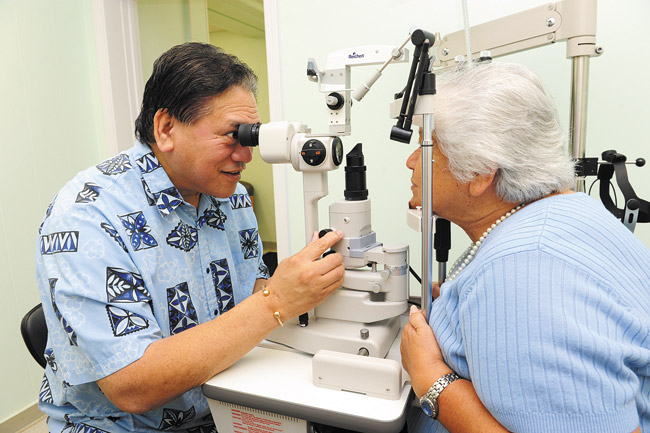Annual Exam For Healthy Eyes
Dr. Isaac Ka’opua
Optometrist at Waimanalo Health Center
Where did you receive your schooling and training?
I graduated from Kalani High School. I have a B.A. in French, B.S. in visual science from Pacific University, and Master of Human Resource Management from the University of Hawaii at Manoa. I completed my optometry training at Pacific University’s College of Optometry in Oregon, and completed my preceptorship at Tripler Army Medical Center.
mw-dih-dr-isaac-kaopua-2
How long have you been in practice?
I’ve been in practice helping people with vision care for 30 years. I’m happy and feel blessed to be back in my hometown, working with and for the people of Waimanalo. Waimanalo Health Center recently opened a Vision Clinic, and we now provide vision services for the community of Waimanalo.
Why did you choose this field of medicine?
I chose optometry because vision is such an important part of our lives. Helping someone in the community who sees 20/400 to seeing 20/20 makes it very rewarding for a community doctor in Waimanalo. It’s truly humbling to have such an impact on the way people see the world.
How important is an annual eye exam?
Annual eye exams are very important because most vision disorders and diseases can be prevented with early detection and treatment. Vision loss in keiki can lead to poor performance in school. Likewise, for adults, vision loss can make daily activities like cooking, driving and reading difficult.
What are some of the more common eye diseases you check for?
Common eye diseases include cataracts, diabetic and hypertensive retinopathy, pterygium and glaucoma. Annual eye exams also check for less-serious vision impairments such as dry eye, near or farsightedness, astigmatism, and the “after 40 syndrome,” where glasses are now needed for reading the newspaper or driving.
What are some of the problems these eye diseases cause?
A cataract is a clouding of the lens inside the eye, which leads to a decrease in vision. It’s usually caused by aging, trauma or over-exposure to UV light and is easily treated with outpatient surgery.
Diabetic and hypertensive retinopathy occur when patients fail to manage conditions of diabetes and hypertension. Retinopathy affects blood vessels in the eye, causing them to distort, leak or sprout new blood vessels to replace faulty ones. Retinal blood vessels distort and become tortuous because of high blood pressure. Built-up pressure could cause blood vessels to burst, leading to partial vision loss. Retinal blood vessel leaks are caused by a blockage, or occlusion, in the blood vessel. Excess fluid leaking into the eye can cause a retinal detachment and can lead to blindness. Diabetic and hypertensive retinopathy can be treated with laser and surgical procedures, but it is crucial to practice good habits, such as regular exercise and managing sugar and salt intake, to naturally control diabetes and hypertension.
Pterygium (pronounced tur-ij-ee-um) is a growth on the cornea and is more commonly known as
“surfer’s eye.” It’s caused by overexposure to UV light, wind and dust, which leads to excess connective tissue growth that obstructs vision. Pterygium is treated by surgical removal.
Glaucoma is caused by an increase in fluid pressure in the eye. Fluid pressure damages optic nerve heads and eventually kills nerves, causing vision loss and blindness. Untreated glaucoma led to the late entertainer Ray Charles’ complete blindness. When detected early, glaucoma is managed with eyedrops or laser surgery.
Treatment of these various conditions becomes more difficult as the eye disease progresses. Timely diagnosis and appropriate treatment are key to preventing vision loss.
Anything else you would like to mention?
People ask me how often I should get my eyes checked. I ask them, “Which would you rather lose, your teeth or your eyes?” Most people I talk to say their teeth because they can get dentures and still eat. A false eye won’t get you to see. Your eyes are irreplaceable; please take care of them. An annual eye exam takes about 45 minutes and will give you peace of mind for the entire year.






